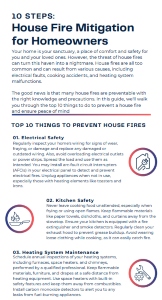House fires are a common and costly peril that homeowners face, and insurers can play a crucial role in mitigating these risks.
To safeguard both policyholders and their own interests, insurance professionals can take proactive measures to prevent house fires.
WaterStreet Company is here to help insurers with digital-first strategies. We offer cloud-based Policy Administration for P&C insurance, designed by insurance experts for insurance experts.
Top Causes of House Fires
According to Forbes, the national average total that U.S. homeowners pay for fire damage restoration is $12,900, with costs varying widely depending on the extent of the damage.
House fires can result from various factors, and understanding these causes is essential for insurers to develop effective mitigation strategies. Here are some common causes of house fires:
- Electrical Faults: Faulty wiring, overloaded circuits, and malfunctioning electrical appliances can lead to electrical fires. These fires often start unnoticed within walls or electrical panels, making early detection difficult.
- Cooking Incidents: Kitchen fires are a leading cause of house fires. Unattended stovetops, hot oil mishaps, and faulty cooking equipment can quickly escalate into devastating fires.
- Heating Systems: Heating equipment, such as space heaters, furnaces, and chimneys, can pose fire hazards if not properly maintained or if combustible materials are placed too close.
- Smoking: Carelessly discarded cigarette butts or matches can ignite fires, especially in homes with smokers.
- Candles: Left unattended, candles can easily cause fires. Flammable materials nearby can exacerbate the situation.
- Flammable Materials: Storing flammable materials like gasoline, paints, or propane tanks improperly in the home or garage can be a dangerous fire hazard.
- Arson: Deliberate acts of arson are another unfortunate cause of house fires.
Financial Implications for Insurers
House fires result in significant financial burdens for insurers, as they are responsible for covering the costs associated with fire damage restoration and replacement of lost or damaged property, with the exception of arson.
The average cost of a house fire can vary widely, ranging from $1,200 for minor repairs in part of a house to a staggering $72,300 for whole-home structural repairs, including roof replacement and kitchen restoration. These expenses not only impact the insurance company’s profitability but may also lead to premium increases for policyholders.
5 Steps for Insurers to Prevent House Fires
1. Risk Assessment and Underwriting
To mitigate the risk of house fires, insurers should conduct thorough risk assessments before underwriting policies. This involves evaluating the age and condition of the electrical systems, heating equipment, and other potential fire hazards in the property. Adjusting premiums based on these assessments can incentivize policyholders to address safety concerns.
2. Education and Awareness
Insurers can collaborate with policyholders to raise awareness about fire prevention. This can include providing educational materials, safety tips, and encouraging the installation of smoke detectors and fire extinguishers. Offering discounts to homeowners who invest in fire prevention measures can also be a powerful incentive.
3. Inspections and Maintenance
Regular inspections of insured properties can help identify and address potential fire hazards. Encourage policyholders to schedule annual inspections of heating systems, electrical wiring, and chimneys, making it a condition for maintaining coverage.
4. Fire-Safe Construction
Encourage or incentivize policyholders to invest in fire-resistant building materials and features. This can include fire-resistant roofing, siding, and windows, as well as the installation of sprinkler systems in high-risk areas.
5. Claims Prevention and Fire Response Training
Insurers can offer policyholders training on how to respond to fires effectively. This includes creating escape plans, knowing how to use fire extinguishers, and understanding when to call for professional help. The goal is to prevent small incidents from escalating into major losses.
WaterStreet for P&C Insurers
House fires present substantial risks for homeowners and insurers alike.To protect policyholders and their own bottom line, insurance professionals must take proactive steps to prevent house fires.
WaterStreet Company provides insurers with cloud-based solutions and an advanced API for your solution to grow with the company. Contact us to request a consultation and demo.





